Odyssey
Odyssey: Homer's famous epic about the homecoming of Odysseus after the Trojan War, penultimate poem of the Epic Cycle.
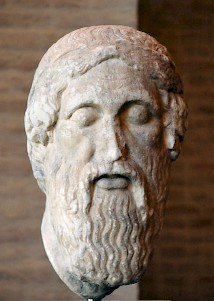
The Odyssey is the penultimate part of the Epic Cycle. It is attributed to the legendary bard Homer, but is considerably younger, perhaps about half a century, than the Iliad, and already in Antiquity, people believed that there must have been two poets. This is correct. The main arguments, proposed by Julius Beloch in the late nineteenth century, is that the poet of the Odyssey is clearly living in the early Iron Age: he mentions cities as something normal, presents a more bourgeois type of hero, and has a better knowledge of the Mediterranean geography. His world is that of the age of colonization, not the Dark Age.
Summary
The Odyssey is the classic example of a story that begins in medias res. The story begins when all survivors of the Trojan War have already returned home, except for Odysseus, who is living on the isle of Ogygia with a nymph named Calypso. All gods, except for Poseidon, agree that he has a right to go home, to his wife Penelope, who is waiting on another island, Ithaca. She has many suitors, and it is likely that she will soon recognize that her husband is probably dead, and remarry.
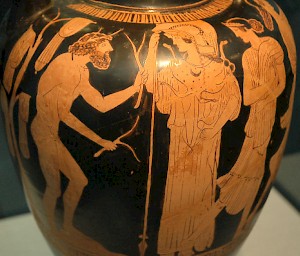
The goddess Athena decides to intervene, and descends to Ithaca, where she meets Odysseus' son Telemachus. Pretending to be a man named Mentor, she suggests the young man to start a search for his father. A ship is prepared, and Telemachus and his friend Mentor (Athena in disguise) sails to Pylos, where he meets Nestor, once his father's comrade-in-arms. The old man tells about the war, but does not know anything about Odysseus' whereabouts. The story about Agamemnon's homecoming is told: he was murdered, but avenged by Orestes: another son who has inherited a task from a war hero.
Telemachus continues his trip to Menelaus and Helen, who live in Sparta. They tell about the difficulties they experienced on their way home - difficulties that will turn out to be trifles compared to what Odysseus has had to suffer - but cannot tell much about the fate of Telemachus' father. All in all, Telemachus' quest proves to be rather pointless.
While Telemachus is in Sparta and Penelope's suitors make a plan to kill the young man, we finally meet Odysseus on Ogygia. After another intervention by Athena, the supreme god Zeus agrees that the Ithacan must now return home, and sends Hermes to order Calypso to let Odysseus go. He builds a raft, and leaves the island. However, Poseidon sees the sailor, and raises a storm that destroys the vessel.
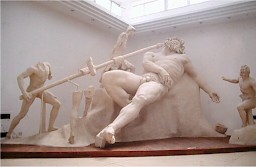
Naked and without anything left, Odysseus arrives on the isle of the Phaeacans, Scheria, where he is found by princess Nausicaa, the daughter of king Alcinous. Although he is treated courteously, Odysseus keeps his identity secret, until a bard sings about the fall of Troy, and describes how the Wooden Horse was built by Odysseus. The hero cannot control his emotions, weeps, and reveals his name.
Now, he tells his story. He left Troy with twelve ships and first reached the land of the Cicones, where he captured a town, but lost 72 people. He continued and reached Cape Malea, where a great storm put him off-course and, from our point of view, out of the known world into the world of fairy tales. The second stop was the country of the Lotus Eaters, where the Ithacans almost forgot that they wanted to go home.
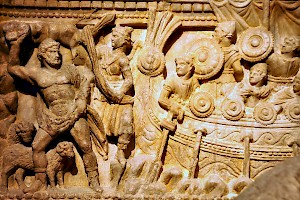
Still, they managed to get away, and reached the island of the Cyclops, which was in Antiquity identified with Sicily. With twelve companions, Odysseus investigated the island, but was taken captive by a Cyclops named Polyphemus, who started to devour his guests. Odysseus, however, gave him some wine; the grateful Cyclops promised him that his guest would be the last to be eaten and asked his name, to which Odysseus replied that his name is Nobody.
When Polyphemus was drunk, the Ithacans blinded him, and managed to escape. The other Cyclopes asked Polyphemus who had blinded him, and when he replied that Nobody had committed the crime, they left him alone. He managed to reach the coast and cast rocks to Odysseus' ship, who now shouted that his real name was Odysseus. This turned out to be a fatal error: Polyphemus cursed the man who blinded him and prayed his father, Poseidon, to punish the evildoer.
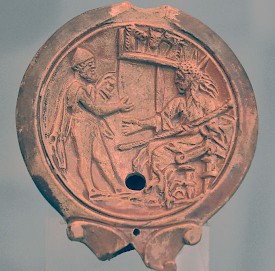
However, it was not Poseidon who created the new problems. The Ithacans reached the island of Aeolus (later identified with the Aeolian Isles), who gave them a bag with a wind that would bring them home, but some foolish sailors abused this bag, and in the end, they returned to the isle of Aeolus. The next stop was the land of the Laestrogones, who threw stones and destroyed eleven ships.
With one ship left, Odysseus reached Aia, where a witch named Circe changed his men into swine. However, Odysseus had been warned by Hermes and managed to save the situation; he even fell in love with Circe and they lived together for a year. Then, it was time to go on, but Odysseus needed guidance, and decided to ask advice from Teiresias, the famous seer - who is in the Underworld. The Ithacan descended, met some of the heroes of the Trojan War, and learned how he could return home.
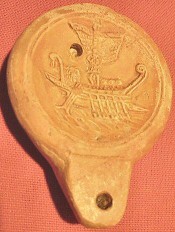
He managed to sail along the Sirens, knew a trick to pass through the Symplegades, evaded two monsters named Scylla and Charybdis, and reached the island Trinacia, where the cattle of Helios were grazing. Unfortunately, Odysseus' companions were hungry and ate the animals; Helios insisted on revenge, and Zeus destroyed the ship with a thunderbolt. Odysseus himself, who had not eaten from the food of the gods, was the only survivor, and washed ashore on Ogygia, where he stayed several years with Calypso. How he reached the island of the Phaeacians, we already know.
Moved by the story, the Phaeacians loan Odysseus a ship to return home. When Poseidon discovers that his enemy has reached Ithaca, he is angry, and transforms the ship into a rock; still, Odysseus is home. This is the end of the first half of the Odyssey, which is essentially about travel.
The second half of the Odyssey deals with events at home, on Ithaca. Here, Odysseus meets Athena, who has the appearance of a shepherd and tells the newcomer where he is. Odysseus again hides his true identity, but Athena smiles and tells him who she is, and promises her help. While Odysseus goes to the swineherd Eumaeus, she leaves to search for Telemachus, who needs protection.
Odysseus is careful not to tell who he is, not even to the loyal Eumaeus, and waits for his son, who has managed to evade the trap that the suitors had prepared, and allows himself to be convinced that the stranger is his father. Next day, they go to the palace - Odysseus' dog recognizes his master and dies from joy - and sees that the suitors are making a mess of the place. He tries to remain anonymous, dressed as a beggar, but Euryclea, one of his servants, recognizes one of his scars.
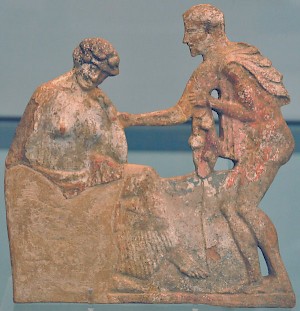
Meanwhile, Penelope, who does not know that her husband has returned, announces that she will marry to the man who is as strong as Odysseus. This will be tested: the suitors must use the bow of the "dead" king. No one, however, is strong enough, until the strange beggar manages to use it. The shoot-out is terrible: Telemachus and Odysseus kill all the suitors.
When this news is brought to Penelope, she refuses to believe that the old beggar is her husband, but in the end she concedes that it must be Odysseus. The last book of the Odyssey tells how the spirits of the dead suitors reach the Underworld
The Odyssey as a poem
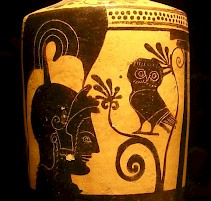
The Odyssey - the title is for the first time mentioned by Herodotusnote - is 12,109 hexameters long, and the reader/listener gets the impression that the author has sometimes tried to make his story as long as possible. (For instance, the last 548 lines appear to be an addition by a later poet.) This may have been an attempt to create something matching the Iliad. Later readers have recognized this and have divided the text into twenty-four books, like the Iliad.
Finally, it should be noted that the Odyssey, with its mysterious avenger, many flash-backs, a woman surrounded by evil men, and a shoot-out, has the same structure as a modern western movie. Perhaps it is no coincidence that one of the most famous westerns is called "My name is nobody" - although the plot has nothing to do with Homer's great poem.